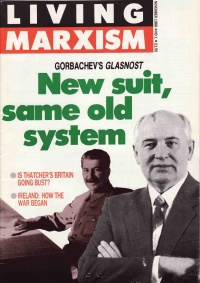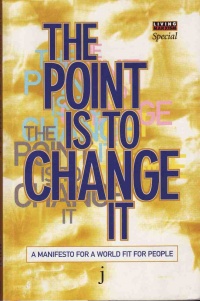Living Marxism
Some sections of this page have been suspended pending further research.

Living Marxism was a magazine published by the Revolutionary Communist Party via its publication company Junius Publications (latterly by Informinc which was incorporated at Companies House on 29 January 1997 immediately before the change of name[1]). It was launched in November 1988, renamed LM in early 1997 and eventually closed down following a libel case bought by ITN in the year 2000. It was replaced in the year 2000 by the Institute of Ideas and a little later by Spiked. It was a key element of what can be called the LM network.
'The GM debate is the terrain upon which society's relationship to science and human endeavour is currently being worked out.' So wrote Tony Gilland in an article called Seeds of the Future in the UK magazine LM, formerly Living Marxism - the monthly review of the Revolutionary Communist Party (RCP).[2]
The RCP has spawned a network, here called the LM network, of political extremists who eulogise technologies like genetic engineering and reproductive cloning and are extremely hostile to their critics, whom they brand as Nazis. What is particularly disturbing is that it is a network which engages in infiltration of media organisations and science-related lobby groups in order to promote its agenda as well as establishing a string of their own organisations.
It is represented, often in very senior positions, in a series of organisations which lobby on issues related to biotechnology, e.g. the Science Media Centre (director: Fiona Fox), Sense About Science (director: Tracey Brown; deputy director: Ellen Raphael), Genetic Interest Group (former policy director: John Gillott), Progress Educational Trust (former director: Juliet Tizzard, later director Sandy Starr), and the Scientific Alliance (advisor: Bill Durodie). Both Tracey Brown and Bill Durodie were also brought in in an advisory capacity in relation to the strands of the UK government's official GM Public Debate.
Contents
Foundation
Living Marxism was launched in November 1988 as the 'monthly review' of the Revolutionary Communist Party, published by the party publishing house Junius Publications. It replaced the previous much more staid 'theoretical journal', Confrontation, first published in 1986. The founding editor of the magazine was long time RCP stalwart Mick Hume and deputy editor was Joan Phillips (aka Joan Hoey). Other prominent RCP activists named as assisting the editor were Andy Clarkson, Gemma Forest, Mike Freeman, Tony Kennedy, Kenan Malik, Pat Roberts and Linda Ryan (a pseudonym for Frank Furedi the party leader).[3]
The Background

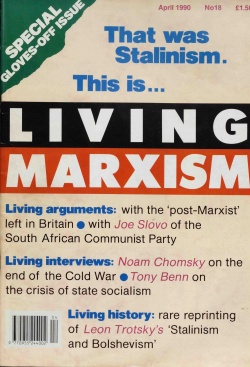
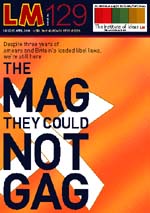
The Revolutionary Communist Party was born out of Trotskyist faction-fighting in Britain in the 1970s. Supporters stood in the 1987 general election campaign as the Red Front, boldly proclaiming that the RCP was about to 'replace' the Labour Party, but the candidates all lost their deposits. Around this time the RCP launched its monthly review Living Marxism.
In the early 90s the RCP underwent a drastic ideological transformation. Its leaders turned their back on seeking mass working class action. The real contradiction in society now lay, they seemed to argue, between those who believed in the increased human domination of nature and those who did not. They declared a total war of ideas on the enemies of human progress.
One of the group's then supporters explains their thinking, 'In England, it is as if the Tories lost their nerve, lost faith in their own project. They could no longer unabashedly support roadbuilding for example. Where is this 14 lane M25 they at one time promised us? ...The trouble is that nowadays if you say: Build roads, use genetically modified crop strains, dump the oil platforms in the North Sea, experiment into xenotransplantation and human cloning, there is an anti-progress alliance from left to right on all this. In fact if you say these things, people can't really tell if you are right or left or just out of it!' (LM and Russia)
In reality, the RCP's new vision, which sought to champion 'progress' by opposing all restrictions on science, technology (especially biotechnology) and business, bore startling resemblances to that of the libertarian Right.
An obvious similarity lay in the RCP's strong antipathy towards the environmental movement. It was as if environmentalists had now replaced the old 'class enemy' for the RCP. The concerns environmentalists raised about the abuse of science, technology and corporate power were 'scaremongering', the RCP now argued, which undermined 'progress' and the emergence of a 'confident individualism' unafraid of risk and experimentation.
Post-modernism and the New Left were also viewed as enemies of 'science', 'progress' and 'the Enlightenment', all of which the RCP defended in a curiously uncritical fashion. Other inhibitants to progress were 'victim culture' and the 'culture of safety' which gave rise to 'risk-aversion' and 'moral panics'. One should pay the least regard, the RCP now argued, to the views of victims or their relatives, whether one was dealing with gun crime, road accidents, Bhopal, BSE, AIDS or whatever, as it only encouraged a culture of fear and caution and so inhibited freedom and progress.
Invasion of the body snatchers
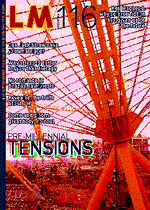
While intellectually the RCP was now singing from the same hymn sheet as elements on the far Right, tactically it drew from elements on the far Left. One tactic practiced by some Trotskyists is 'entryism'. Traditionally this has involved infiltrating a trade union or a political party in order to try and exert a disproportionate influence over its direction. To forward its new war of ideas, the RCP initiated a new style of entryism. Suddenly its members were sharp suited and organising seminars.
'Its call in the early 1990s to "return to the suburbs" saw it embark on a project of infiltrating academic and media circles in a style reminiscent of Invasion of the body snatchers,' commented a rival Marxist publication, The Weekly Worker. 'To give praise where it is due, our upwardly mobile executive "Marxists" have managed to worm their way into the appropriate dinner parties, seminars, and conferences.'
As part of this process, Living Marxism changed its name in the mid-1990s to LM, selling the title to associate Helene Guldberg while the Party itself was formally liquidated. One member complained, 'In recent times, people like myself have had to stand back and watch as the organisation, its discussions and activities, have been closed down and party leaders have switched from calling themselves die-hard communists to espousing the virtues of the free market. While Mick Hume, Claire Fox and others at the top were building up a coterie of followers in the academic and media world, we were being told: "Our aim is social revolution." Yet within a short time the party was declared finished and anyone who expressed any vaguely leftwing sympathies were ridiculed as being old-fashioned "liberals", "Trotskyists" and sometimes even both.'
But the core of the party had not been liquidated. The new glossier looking LM was still the vehicle of those who had been the party's leadership. The editor, as of Living Marxism, was the head of the RCP, Mick Hume. LM's star columnist was the RCP's chief theoretician, the sociologist Frank Furedi (aka Frank Richards). LM's regular contributors continued to be made up by other leading lights of the RCP. And they and their closest supporters continued to meet to discuss tactics and ideology. The difference was that such meetings were now by invitation only.
Against Nature - the war zone
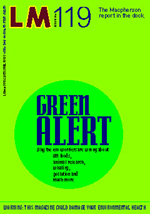
In the late 1990's LM's 'most spectacular coup', according to The Weekly Worker, 'was the three hours of prime-time television, in the form of Channel Four's anti-green Against Nature. Frank Furedi was the star of the show.'[5]
Against Nature targeted environmentalists, presenting them as 'the new enemy of science' and comparable to the Nazis. They were responsible, the programmes argued, for the deprivation and death of millions in the Third World. (Crimes against Nature, The Revolution Has Been Televised)
Channel Four had to broadcast a prime-time apology after Against Nature drew the wrath of the Independent Television Commission which ruled, 'Comparison of the unedited and edited transcripts confirmed that the editing of the interviews with [the environmentalists who contributed] had indeed distorted or misrepresented their known views. It was also found that the production company had misled them... as to the format, subject matter and purpose of these programs.' (See CHANNEL 4 SAVAGED BY TELEVISION WATCHDOG)
Against Nature provided a platform not only for LM columnists like Frank Furedi, John Gillott (aka John Gibson) and Juliet Tizzard, all of whom were billed by the programme makers as independent experts, but for a whole string of contributors from the far Right. Extreme advocates of free-market capitalism were also increasingly to be found expounding their views in the pages of LM. The magazine published pieces, for instance, by the Executive Vice President of the Center for the Defense of Free Enterprise, Ron Arnold. Arnold's mission was their mission, 'This is a war zone. Our goal is to destroy, to eradicate the environmental movement'. (Far Left or Far Right? Living Marxism's interesting allegiances)
According to Frank Furedi, such alliances are all part of LM's regrouping of 'all those who believe human beings should play for high stakes' (LM 100). LM loyalist Adam Hibbert admits that working with the far Right, 'might appear duplicitous and fraught with the danger of assimilation', but asserts that as long as the activist is alert to these dangers, 'much more progress is possible: and that is our overriding duty, if we're serious.' (Re: For Hibbert: LM and Russia)
Against Nature's director Martin Durkin and his production team went on to make an almost equally controversial TV programme about GM for Channel Four, in which GM proponents like CS Prakash played a starring role. (see Getting your science from charlatans)
Defending Monsanto in the Wall Street Journal
However self-perpetuating and self-promoting the LM world may be, it is one that has been far from unchanging in the three decades since the birth of the RCP. The once fervent Trotskyist, Frank Furedi, who has been called the 'Father of the modern RCP', has in recent years been found defending Monsanto in the columns of the Wall Street Journal and pamphlet writing for the Centre for Policy Studies, a think tank founded by Margaret Thatcher and Keith Joseph. His CPS pamphlet was advertised alongside those of Lord Archer and Lord Saatchi.
Frank Furedi is even said to have tried to hock his services to the supermarket chains and the Food and Drink Federation as someone who could help them put consumers' minds at rest on food safety issues.[6] He also penned a reassuring report on risk for Lloyds of London which Lloyds say 'has the potential to be invaluable to our business'. A decade earlier Living Marxism had dismissed Lloyds as 'a benevolent fund for the rich' (LM 43).
This corporate-alignment is also to be found at Spiked and still more at the Institute of Ideas (IoI) where events are put on, for example, in 'association with Pfizer', the giant pharmaceutical company that aggressively promotes biotech, and with 'thanks' to CropLife International (a 'global federation' led by BASF, Bayer, Dow, DuPont, Monsanto and Syngenta). In a Times' interview, the IoI's director, Claire Fox, is drawn on another sponsor, Novartis. Asked who they are, she responds, 'Pharmaceuticals, I think. I don't know who they are.'[7]
Some of Furedi's followers appear to believe that he is just biting back the revolutionary critique in order to realign and mobilise forces who can, despite themselves, further the interests of the revolution. How those who choose to make use of the services provided by Furedi and his followers view the relationship is another matter. Like Lloyds, presumably, they see something of value for their businesses.
Many of 'Furedi's children' have emerged from his base at the University of Kent Canterbury. Amongst these are Tracey Brown and Ellen Raphael, both of whom have gone on to work for PR company Regester Larkin. Regester Larkin help many of the major oil, pharmaceutical and biotech corporations manage their reputations in the face of what they term 'anti-technology activists' and 'risk averse' consumers. Regester Larkin's PR terminology is that honed by Furedi and LM.
Keith Teare is another of Furedi's 'offspring'. Teare has written of his time at the University of Kent, 'I got a double first on an essay I wrote for Frank Furedi, who became a kind of mentor. We still keep in touch.' This seriously understates the relationship. Teare, under the name Keith Tompson, became a leading member of the RCP and in the 1980s headed the RCP front organisation Workers Against Racism.
In the mid-90s, with the RCP heading more and more in its new pro-technology, pro-enterprise direction, Teare helped set up a series of internet business ventures, including Cyberia, Easynet, and Cscape. These were mostly headed by and employed other RCP-ers. Teare then went on to become a Silicon Valley tycoon, enjoying a roller coaster romp] through the boom years of the new economy bubble.[8]
During the Microsoft anti-trust trial Teare made a spirited defence of Microsoft and the American way of life - a line that was also peddled in LM. That, however, was before Microsoft pulled the plug on Teare's company, plunging it into liquidation. Since then some have accused Teare] of playing the victim.[9] His views on Microsoft certainly appear to have changed radically:[10]
- 'We believe that Microsoft's investments should be seen for their positive impact not as a sign of monopolistic hidden agendas.' Keith Teare, June 7 2000
- 'Microsoft killed a whole market. It is a poor business decision made by souless people who clearly have the arrogance that comes from absolute power.' Keith Teare, June 4 2002
In Teare's extraordinary journey there seems to be a kind of metaphor for what happened to the RCP.
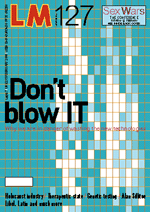
People
On its launch Living Marxism had the following staff listed: Editor Mick Hume, Deputy Editor Joan Phillips, Assisted by Andy Clarkson, Gemma Forest, Mike Freeman, Tony Kennedy, Kenan Malik, Pat Roberts, Linda Ryan, International Editor Daniel Nassim, Assisted by Stefanie Boston, James Malone, Russell Osborne, Reviews Pat Ford, Production and design Co-ordinator Dave Lamb, Production and Design Don Bannister, Tony Costello, Joanna Doyle, Sara Hardy, Sean Thomas, Joe Watson, Marketing Manager Suke Karey.[11]
Publications
Living Marxism began publication in November 1988. LM also published a number of pamphlets a continuation of the kind of material regularly put out by the RCP and published by Junius Publications.
Pamphlets
1997
- Mick Hume, Whose War Is It Anyway: The Dangers Of The Journalism Of Attachment, LM, 1997. 28 pages, ISBN: 9780953132003
1998
- Mick Hume, Televictims - emotional correctness in the media AD (After Diana), LM magazine, 1998.

Living Marxism/LM
1988
No. 1
- Linda Ryan 'What's the big Idea?', Living Marxism, November 1988, No. 1, p. 3.
- Editorial 'The Living and the Dead', Living Marxism, November 1988, No. 1, p. 4-5.
- Frank Richards, 'revolutions don't come from above', Living Marxism, November 1988, No. 1, p. 6-10.
- Tony Kennedy 'Lawson's luck is running out', Living Marxism, November 1988, No. 1, p. 12-16.
- Nigel Lewis 'The biggest bat-shoot in history', Living Marxism, November 1988, No. 1, p. 17.
- Mike Freeman and Gemma Forest 'Old ideas for New times', Living Marxism, November 1988, No. 1, p. 18-23.
- James Malone 'President of Disneyland', Living Marxism, November 1988, No. 1, p. 24
- Stephanie Boston 'A new coup behind closed doors?', Living Marxism, November 1988, No. 1, p. 25-28.
- Alan Harding 'A very British coup', Living Marxism, November 1988, No. 1, p. 29.
- Mark Reilly 'How the war began', Living Marxism, November 1988, No. 1, p. 30-34.
- Joanna Doyle, 'Policing the young' review of Digby Anderson, Full Circle? Bringing Up Children in the Post-Permissive Society, Social Affairs Unit, Living Marxism, November 1988, No. 1, p. 35.
- Manjit Singh 'Got the time?', Review of Stephen Hawking, A Brief History of Time, Bantam Press, Living Marxism, November 1988, No. 1, p. 35.
- Kenan Malik 'Lifting the siege', 'Book of the Month', Review of Keith Tompson, Under Siege, Penguin, Living Marxism, November 1988, No. 1, p. 36.
1989
1990
1991
1992
No. 41 - March
4 Editorial: the construction of the Islamic Bomb 6 Letters 8 Benetton: what's the fuss about? Jenny McLaren 11 Ann Bradley 12 An election without issues Tessa Myer 15 The Daily Dirt Tessa Myer 16 Scotland: what is not happening Kirk Williams 18 Music: a classic deception Mark Reilly 19 Toby Banks 20 Return of the Anti-Nazi League Eddie Veale, Kenan Malik 23 Kurds and Codes in Hackney Andrew Calcutt 24 'Who controls the past...' Frank Füredi 28 Eastern Europe: dustbin of history Irene Miller 29 JFK: no more heroes Emmanuel Oliver 30 How to invent a nation Joan Phillips 35 Women still aren't equal Sara Hardy 36 Living: Natural childbirth German film Posh accents Mantegna 40 Frank Cottrell-Boyce on TV 43 The Marxist Review of Books: The Columbus debate
1993
1994
1995
- Fiona Foster, "Massacring the truth in Rwanda", LM 85, December 1995. "This was not a pre-planned genocide of one tribe by another...The lesson I would draw from my visit is that we must reject the term 'genocide' in Rwanda."
1996
1996
- Helen Simons and Barry Crawford, "Rwanda: the great genocide debate", LM 88, March 1996. "In reality the Rwandan war was not a campaign of genocide motivated by ethnic hatred."
1997
- Thomas Deichmann, "The picture that fooled the world", LM 97, February 1997. Accuses ITV reporters of faking footage of emaciated Bosnian muslims in a Serb detention centre.
1998
- Ron Arnold, "Unabomber: a darker shade of green", LM 108, March 1998. Argues that the unabomber is an environmentalist.
- Ceri Dingle, "Fox Hunting is Fun", LM 108, March 1998. "The hunting fraternity should stop waffling about pest control and economics and speak up for the thrill of the chase".
1999
- Rune Frøvik and Simon Ward, "The whaler's tale", LM 119, April 1999. Describes restrictions on whaling as "cultural imperialism".
2000
127 - February 2000
128 - March 2000
- 4 Mick Hume Setting the record straight
- 6 LM Online
- 6 Signs of the times
- 8 NHS in traction Dr Michael Fitzpatrick
- 10 Autism cures: communication breakdown Dr Jennifer Cunningham
- 12 Abuse of trust Frank Furedi
- 14 Prisons of the mind Brendan O'Neill
- 14 Wot no fear? Kenneth McLaughlin
- 16 Pill-oried Carl Djerassi talks to Ellie Lee
- 17 Embryonic developments Juliet Tizzard
- 18 Genetic engineering: a cautionary tale John Gillott
- 20 LM Mail
- 21 Opinion: AIDS - an epidemic of complacency? Ann Bradley
- 22 Britishness buried alive Andrew Calcutt
- 22 Geed up over Ali G Ed Barrett
- 24 Blairing out? Jennie Bristow
- 26 Inside the Dome Penny Lewis
- 28 Anti-harassment codes: too close for comfort Sara Hinchliffe
- 28 Love on the job? Tessa Mayes
- 30 An Englishwoman in Washington: Government plots Helen Searls
- 32 Working mums: all or nothing? Ann Furedi
- 34 Sex education: lessons in life Stuart Waiton
- 35 Second Opinion: The dangers of deference Dr Michael Fitzpatrick
- 36 'It has worked at a price' Margaret Forster talks to Jennie Bristow[12]
Culture Wars
- 38 Painting by politics Mark Ryan
- 38 Shooting straight Michael Walter
- 39 Dung ho Aidan Campbell
- 40 Past tense: the Elgin Marbles Ian Walker
- 40 Veiled truths Claire Fox
- 41 Imposing cultural white space Mike Small
- 42 Vetting the net Chris Evans
- 43 Reading between the lines: What makes a good children's book - or a principled football manager?
129 - April 2000
4 Mick Hume The only thing this case has proved 'beyond reasonable doubt' is that English libel law is a disgrace to democracy and a menace to a free press
- 6 LM Online
- 8 Counsel estates Brendan O'Neill
- 10 Modern footballers: kicked about Carlton Brick
- 11 Italy's banners Dominic Standish
- 12 Austria-cised Linda Ryan
- 13 Opinion: Ill-conceived advice Ann Bradley
- 14 Politics today: trivial pursuits? Frank Furedi
- 16 London's mayor - who cares? Bruno Waterfield
- 16 A queer platform Peter Tatchell talks to Sandy Starr
- 18 A coup from within Mark Seddon
- 20 Nuclear reaction Joe Kaplinsky
- 21 Fudging Frankenfood Tony Gilland
- 23 Beach games Jennie Bristow
- 24 Addiction addicts Dr Michael Fitzpatrick
- 26 SAD and MAD in Scotland Dolan Cummings
- 27 An Englishwoman in Washington: Primary colours Helen Searls
- 28 Taboos: Smacking law - a walloping bad idea Ann Bradley
- 30 Peer fear Simon Knight
Culture Wars
- 32 The hollow men Claire Fox
- 34 Your guide to joining the new cultural elite Claire Fox
- 34 Culture vultures Mark Ryan
- 35 LM at the Bath Literature Festival
- 36 In a 'Tis about literature Irene Miller
- 37 Second Opinion: Screen test Dr Michael Fitzpatrick
- 38 Jobs for lifestyles Jennie Bristow
- 41 Ireland - no Plan B Brendan O'Neill
- 42 The Mars Society: spaced out? Dr Robert Zubrin talks to Helen Searls
- 43 Reading between the lines: Why a society with more pensioners should not slow us down
Resources
For a full list of reading and resources see LM network: Resources
Notes
- ↑ Data from companies House: INCORPORATION DOCUMENTS CERTIFICATE OF INCORPORATION STATEMENT OF DIRECTORS & REGISTERED OFFICE DECLARATION OF COMPLIANCE MEMORANDUM OF ASSOCIATION ARTICLES OF ASSOCIATION, 29 January 1997
- ↑ Tony Gilland Seeds of the FutureLM, No. 119, April 1999.
- ↑ Living Marxism, No. 1 November 1988
- ↑ 'Welcome to the new-look LM', LM, February 1997, retrieved from the Internet Archive of 18 February 1998, accessed 27 October 2010
- ↑ Danny Hammill, RCP's designer liquidationism, Weekly Worker 230, March 5 1998, version placed in web archive 7 Mar 2007, acc in web archive 28 Apr 2010
- ↑ Nick Cohen, Boardroom revolutionaries, The Observer, October 1998
- ↑ Andrew Billen, A prickly opinion on just about everything, The Times, 17 Dec 2002, accessed 24 Nov 2009
- ↑ Nothing but sour grapes, accessed 24 November 2009
- ↑ "Oops! I did it again", accessed 24 Nov 2009
- ↑ "Oops! I did it again", accessed 24 Nov 2009
- ↑ 'Living Marxism, November 1988, No. 1, p. 2.
- ↑ Informinc Issue 128, March 2000 LM Archives, Retrieved from the Internet Archive of 8 april 2000, accessed 26 January 2011
